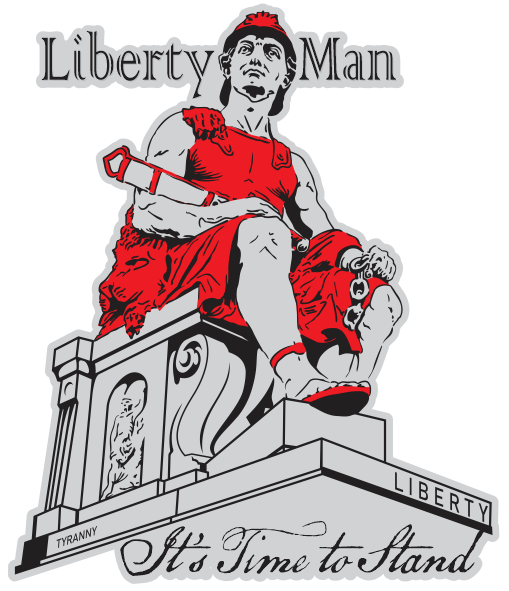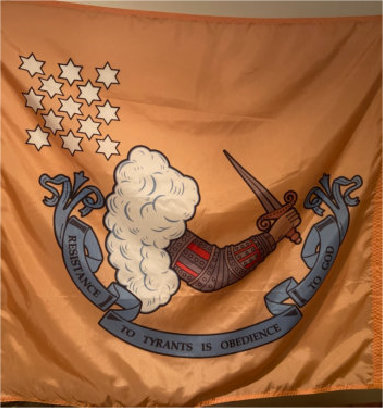


Resistance to Tyrants is Obedience to God
This is the Gostelowe Battle Flag of the American Revolution.
This was a Pennsylvania militia flag and its design is credited to Philadelphia businessman Jonathan Gostelowe. It shows thirteen stars representing the thirteen American Colonies/States during the America Revolution. It displays an armored arm coming out of the cloud representing Jehovah-sabaioth- The LORD of Hosts or the God of Armies.
I Samuel 17:45 (NASV)
Then David said to the Philistine [Goliath of Gath], “You come to me with a sword, a spear, and a javelin, but I come in the name of the LORD of hosts, the God of the Armies of Israel, whom you have taunted.
The phrase “Resistance to Tyrants is Obedience to God” was the slogan for the American Revolution. Like David facing Goliath over two thousand years prior, the Americans knew they had nothing on their side except the protection of the Lord of Hosts. Benjamin Franklin proposed that slogan in his draft for the new nation’s seal. Jefferson proposed a similar wording in his design, replacing resistance with rebellion. There is no debate that this was the slogan of the American Revolution. After the French and Indian War a constitutional battle was waged between the thirteen American Colonies and the British King George III and his Parliament. The American cause was preached from the pulpits long before it made its way to the councils and committee tables of American government.
John Adams credited the preachings of the Rev. Dr. Johnathan Mayhew and Rev. Dr. Samuel Cooper as being the two most “most conspicuous, the most ardent, and influential” individuals in the “awakening and revival of American principles and feelings” leading up to independence. America was born out of the Protestant Reformation and beginning in 1740 the First Great Awakening in America began when the pulpits “roared,” first calling the people back to a personal relationship with God and encouraging them that “resistance to tyranny was obedience to God.”
Rev. Mayhew preached A Discourse Concerning Unlimited Submission and Non-Resistance to the Higher Powers. It was published as a pamphlet and sent to England as an argument for the American cause. This was one of the sermons that argued the 27 grievances in the Declaration of Independence.
Rev. Samuel Davies was a mentor to the young Thomas Jefferson and Patrick Henry in western Virginia. We plainly see his fire in those men’s commitment to Liberty. He preached to a militia company preparing to enter the fight:
In 1824 Major General the Marquis de Lafayette had this to say commemorating the opening battle of the Revolution at a celebration at the Lexington Battlefield with 14 surviving veterans attending.
The General, with great sensibility, expressed his warmest thanks for the flattering attention he had received from the people of Lexington, the satisfaction and pleasure he felt in standing upon the soil consecrated by the blood of patriots to the glorious cause of freedom throughout the world, and the high gratification he experienced in beholding the surviving remnant of that heroic band [14 survivors of that day present], which here inaugurated that resistance to tyrants which is obedience to God.
Historian Clinton Rossiter concluded:
By the coming of the Revolutionary era America’s religious future had been fixed. America would be a land of religious freedom, and American politics would be conducted accordingly. Yet true religious feeling was, if anything, more widely held than in many European countries where conformity and establishment remained state policy. The principles of the awakening American democracy were to be thoroughly moral, if not indeed religious, in character. The men of 1776 believed that the good state would rise on the rock of private and public morality, that morality was in the case of most men and all states the product of religion, and that the earthly mission of religion was to set men free. It was no mere pose when they justified resistance to oppression as obedience to God and an appeal to heaven.
Because of inspiration from the pulpit the Americans declared that they recognized “No King But Jesus”. They understood what the God of the Holy Bible had done for them every step of the way. They knew what that God was capable of doing for them if they would stay faithful to His will contained only in the Scriptures of the Holy Bible. America if you want to keep your nation as founded to your posterity inviolate, you must once more become an American that resists tyranny in all forms armed with the Sword of the Spirit and declare No King But Jesus. It will take a miracle to right this ship. Wake up America and STAND.